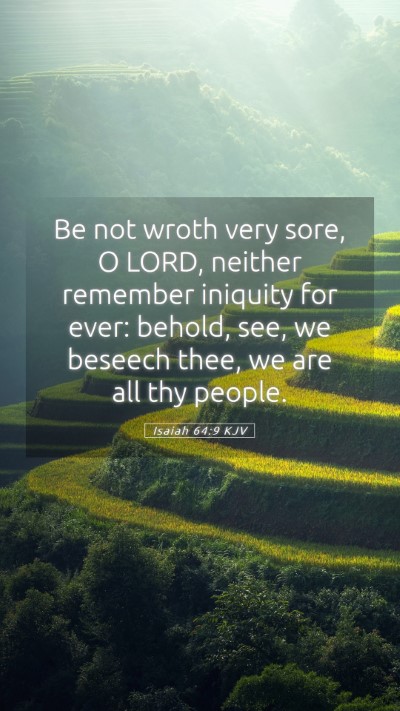Understanding Isaiah 64:9: A Comprehensive Bible Verse Commentary
In the Book of Isaiah, chapter 64, verse 9, the prophet petitions God, acknowledging His sovereignty and pleading for mercy. This verse holds significant theological implications and provides deep insights into human nature and the divine character. Below, we explore the meaning of this verse using insights from renowned biblical commentators.
Isaiah 64:9 - Text and Context
“Do not be exceedingly angry, O LORD, and do not remember iniquity forever; indeed, please look—we are all Your people!” (Isaiah 64:9, NKJV)
In this context, Isaiah addresses the Lord, expressing a plea for compassion amid the people's transgressions. The verse encapsulates the tension between God's holiness and mercy.
Detailed Commentary and Interpretations
This verse can be interpreted through various lenses:
- God's Righteous Anger: Matthew Henry describes how this plea acknowledges God’s right to be angry due to the people's sins. Henry emphasizes that while God is justly angry, He is also willing to forgive.
- Mourning Over Sin: Albert Barnes notes the awareness of sin that Isaiah reflects. The humble recognition of wrongdoing is essential for sincere repentance and reconciliation with God.
- The Call for Divine Compassion: Adam Clarke elucidates the emotive plea of this verse, highlighting that Isaiah appeals to God's nature as a loving and merciful deity, imploring Him to set aside His wrath for the sake of His people.
Key Themes in Isaiah 64:9
This verse encapsulates several key themes that aid in understanding its context:
- Divine Mercy: The plea for God to not remember iniquities speaks to humanity's dependence on divine mercy for salvation and restoration.
- Corporate Accountability: Isaiah's use of "we are all Your people" highlights the collective nature of sin within the nation, portraying a communal relationship with God.
- Hope in Judgment: Despite the acknowledgment of sin, there is a thread of hope; recognizing that even in judgment, God’s mercy may prevail for those who seek His face.
Applications for Today
Understanding Isaiah 64:9 remains pertinent in contemporary Christian life.
- Repentance and Humility: The verse encourages believers to approach God with humble hearts, recognizing their sins and seeking His forgiveness.
- Emphasizing God's Nature: It invites believers to reflect on God's character—His readiness to forgive and His desire for His people to turn back to Him.
- Community and Restoration: The communal aspect of sin suggests that believers should not only seek personal restoration but also encourage collective repentance and healing within their communities.
Cross References
The themes in Isaiah 64:9 resonate with various other scripture passages:
- Psalms 130:3-4: "If You, LORD, should mark iniquities, O Lord, who could stand? But there is forgiveness with You, that you may be feared."
- Joel 2:13: "So rend your heart, and not your garments; return to the LORD your God, for He is gracious and merciful, slow to anger, and of great kindness."
- Romans 5:8: "But God demonstrates His own love toward us, in that while we were still sinners, Christ died for us."
Conclusion
In summary, Isaiah 64:9 serves as a profound reminder of God's mercy amidst human sinfulness. This commentary helps elucidate the verse's meaning while providing valuable insights for Bible study groups, individual reflection, and deeper scripture analysis. Embracing the themes of repentance and divine compassion can significantly enrich one’s understanding of Scripture and guide daily living.


